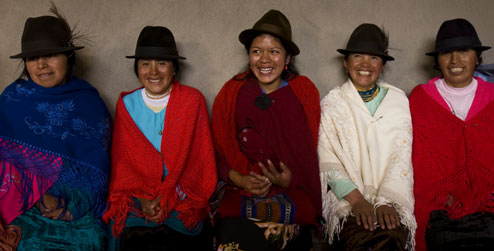
“People in the cities – they make the decisions, but they don’t know what it is like here.
“They are in their offices, they cannot imagine this life – maybe if they visited, but they do not.
“Rural people eat, breathe and sleep agriculture. For this we need water. We have to protect mother earth, and care for her.”
Fabiola Quishpe lives in the remote Andean community of Apahua in Ecuador, some 4,000m above sea level. She lives in the páramo, sensitive grasslands that act like a giant sponge, soaking up water and then releasing it into the valley below. The páramo provides water for hundreds of thousands of people – but today its delicate ecosystem is at risk. In recent years, 30% of it has been destroyed.
The women of Fabiola’s village decided to take action – their menfolk tend to work away from home. Now, 150 women from across the region are involved in protecting local water resources and recovering native seed, with help from Progressio. Already they have recovered 27 varieties of potato, well adapted to local conditions, and have started to cultivate many of them.
“Now people don’t let their animals graze on the páramo, and they don’t burn it,” says Fabiola. “We are getting back all the wild grass varieties, the bushes and native animals we lost. People don’t even think about damaging the grasslands anymore – instead, they know that it’s important for conserving water. If we don’t have water, how are we going to survive?”
Photo: Fabiola Quishpe (in white poncho) with other members of the Apahua community, province of Cotopaxi, Ecuador. (Photo © Santiago Serrano/Progressio)


